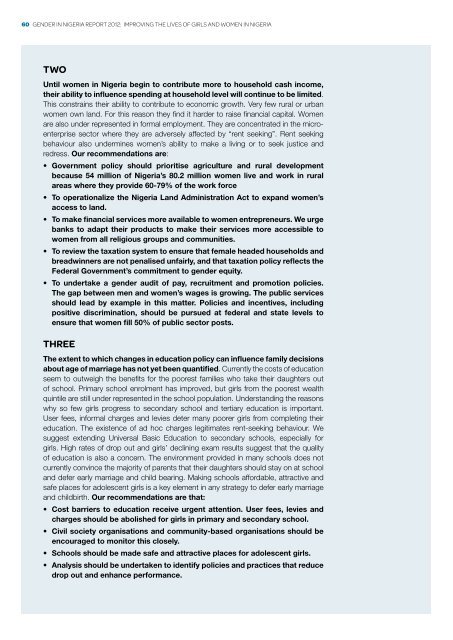Gender in niGeria report 2012 - Economic Commission for Africa
Gender in niGeria report 2012 - Economic Commission for Africa
Gender in niGeria report 2012 - Economic Commission for Africa
Create successful ePaper yourself
Turn your PDF publications into a flip-book with our unique Google optimized e-Paper software.
60 <strong>Gender</strong> <strong>in</strong> Nigeria Report <strong>2012</strong>: Improv<strong>in</strong>g the Lives of Girls and Women <strong>in</strong> Nigeria<br />
Two<br />
Until women <strong>in</strong> Nigeria beg<strong>in</strong> to contribute more to household cash <strong>in</strong>come,<br />
their ability to <strong>in</strong>fluence spend<strong>in</strong>g at household level will cont<strong>in</strong>ue to be limited.<br />
This constra<strong>in</strong>s their ability to contribute to economic growth. Very few rural or urban<br />
women own land. For this reason they f<strong>in</strong>d it harder to raise f<strong>in</strong>ancial capital. Women<br />
are also under represented <strong>in</strong> <strong>for</strong>mal employment. They are concentrated <strong>in</strong> the microenterprise<br />
sector where they are adversely affected by “rent seek<strong>in</strong>g”. Rent seek<strong>in</strong>g<br />
behaviour also underm<strong>in</strong>es women’s ability to make a liv<strong>in</strong>g or to seek justice and<br />
redress. Our recommendations are:<br />
• Government policy should prioritise agriculture and rural development<br />
because 54 million of Nigeria’s 80.2 million women live and work <strong>in</strong> rural<br />
areas where they provide 60-79% of the work <strong>for</strong>ce<br />
• To operationalize the Nigeria Land Adm<strong>in</strong>istration Act to expand women’s<br />
access to land.<br />
• To make f<strong>in</strong>ancial services more available to women entrepreneurs. We urge<br />
banks to adapt their products to make their services more accessible to<br />
women from all religious groups and communities.<br />
• To review the taxation system to ensure that female headed households and<br />
breadw<strong>in</strong>ners are not penalised unfairly, and that taxation policy reflects the<br />
Federal Government’s commitment to gender equity.<br />
• To undertake a gender audit of pay, recruitment and promotion policies.<br />
The gap between men and women’s wages is grow<strong>in</strong>g. The public services<br />
should lead by example <strong>in</strong> this matter. Policies and <strong>in</strong>centives, <strong>in</strong>clud<strong>in</strong>g<br />
positive discrim<strong>in</strong>ation, should be pursued at federal and state levels to<br />
ensure that women fill 50% of public sector posts.<br />
Three<br />
The extent to which changes <strong>in</strong> education policy can <strong>in</strong>fluence family decisions<br />
about age of marriage has not yet been quantified. Currently the costs of education<br />
seem to outweigh the benefits <strong>for</strong> the poorest families who take their daughters out<br />
of school. Primary school enrolment has improved, but girls from the poorest wealth<br />
qu<strong>in</strong>tile are still under represented <strong>in</strong> the school population. Understand<strong>in</strong>g the reasons<br />
why so few girls progress to secondary school and tertiary education is important.<br />
User fees, <strong>in</strong><strong>for</strong>mal charges and levies deter many poorer girls from complet<strong>in</strong>g their<br />
education. The existence of ad hoc charges legitimates rent-seek<strong>in</strong>g behaviour. We<br />
suggest extend<strong>in</strong>g Universal Basic Education to secondary schools, especially <strong>for</strong><br />
girls. High rates of drop out and girls’ decl<strong>in</strong><strong>in</strong>g exam results suggest that the quality<br />
of education is also a concern. The environment provided <strong>in</strong> many schools does not<br />
currently conv<strong>in</strong>ce the majority of parents that their daughters should stay on at school<br />
and defer early marriage and child bear<strong>in</strong>g. Mak<strong>in</strong>g schools af<strong>for</strong>dable, attractive and<br />
safe places <strong>for</strong> adolescent girls is a key element <strong>in</strong> any strategy to defer early marriage<br />
and childbirth. Our recommendations are that:<br />
• Cost barriers to education receive urgent attention. User fees, levies and<br />
charges should be abolished <strong>for</strong> girls <strong>in</strong> primary and secondary school.<br />
• Civil society organisations and community-based organisations should be<br />
encouraged to monitor this closely.<br />
• Schools should be made safe and attractive places <strong>for</strong> adolescent girls.<br />
• Analysis should be undertaken to identify policies and practices that reduce<br />
drop out and enhance per<strong>for</strong>mance.

















